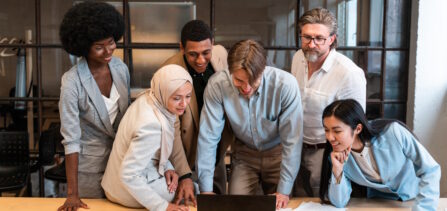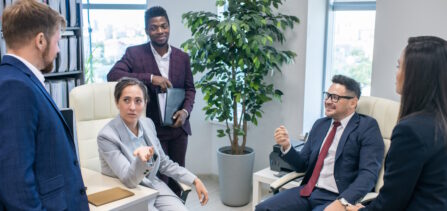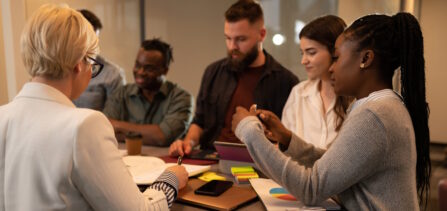
Counselling Skills and their Use in Training
Good counselling is flexible rather than fixed to a rigid structure: the counsellor sees what a client needs and is able to provide that flexibility.
Counselling Skills in Training
Look at the non-technical areas that much training addresses.
Communication, Personal Effectiveness, Team Building, and Presentation are all areas that touch on people’s Self-Esteem, Value and Confidence.
In unskilled hands, participants can finish their training feeling undermined and unsupported.
This article examines why counselling skills are an essential part of effective learning.
Group Training or One-to-One Coaching
Most of the time we talk of counselling at work as taking place in a one-to-one format. Working over a limited number of sessions, issues are addressed that affect people’s performance at work. In that setting, the counsellor uses his or her specialised abilities to facilitate clients being able to understand and deal more effectively with their specific issues.
What is less talked about is the use of counselling skills in training workshops. In this context, too, the use of counselling skills can have a significant and positive impact on the intended outcome.
Training can be damaging to your health! When you look at the non-technical areas that much training addresses communication, personal effectiveness, team building, presentation, etc. Then you can see that all these areas touch on people’s self-esteem, value and confidence.
Unskilled Training
In unskilled hands, participants can finish a training feeling undermined and unsupported. And this is often why companies shy away from ‘touchy-feely’ training that they fear won’t really make things better. At Impact Factory we believe that counselling skills are essential to good training and we require all of our facilitators to have some background in the use of counselling or psychotherapy skills.
By this, we are not talking about group therapy, which by its very nature needs to be facilitated by counsellors or psychotherapists. We mean the sort of courses Impact Factory runs. Structured, active training, with delegates participating in a variety of processes and exercises.
However, our experience shows that the use of counselling techniques in training makes for a better outcome. Just about any interactive workshop situation can benefit from the use of counselling skills. We view good training as personal development, not just a place to learn new tools and techniques.
Similarities between One-to-One Counselling and Group Work
Part of the purpose of counselling is to facilitate clients in developing their ability to cope with stress. And deal more effectively with difficult or challenging situations as they arise.
As esteem and confidence are increased, individuals have a greater capacity to change their behaviour in healthy and appropriate ways.
Good People Skills Training
So, too, with good people skills training. These kinds of workshops should not be places where participants are ‘trained’ in the ‘right’ way to communicate, to present, and to lead others.
Unfortunately, that is often what happens. Participants are given rigid rules and regulations which can be demotivating and can shut down their creativity and enthusiasm for finding their own solutions.
When counselling skills are used in training, delegates’ esteem and capabilities are dramatically increased. As a consequence of this, their capacity to take in new information and integrate it is far greater.
Much of the feedback Impact Factory receives after a training can be summed up like this:
“You didn’t try to change me, but let me find my own way”
This is also what counselling is about: not changing the person, but helping them to become more authentically themselves.
Obvious Transferable Counselling Skills
There are the obvious transferable Counselling Skills such as:
- Creating a safe environment so that people are more able to take risks
- Setting effective boundaries so that delegates know where they stand and what’s expected of them within a workshop format
- Using active listening and responding skills, which allow participants to feel heard and understood
- Working in a non-shaming way so that people can disclose some of their concerns
- Allowing participants to work at their own pace
- Not pushing or forcing delegates to do things they don’t want to do
- Letting people find out what works best for them
- Allowing people to find their own solutions rather than giving advice or answers, while at the same time offering a range of options for them to practise
- Understanding that there will be issues of transference and projection during even the shortest training session
Practising New Behaviour
Workshops are just that. Places for delegates to explore different options and practise new ways of behaving where there are no career-limiting consequences, mirroring the exploratory nature of counselling.
They may experience unusual or even uncomfortable feelings. But they will also discover not only what works best for them but also what they know they’ll be able to put into practice in the ‘real world’ outside the training arena.
Good counselling is flexible rather than fixed to a rigid structure. The counsellor sees what a client needs and is able to provide that flexibility.
People skills training also needs to be flexible and attuned to the needs and capabilities of the group rather than sticking to a fixed, prepared structure. Having counselling skills enables a trainer to change that structure when they see what else might be needed.
Work With What They Bring
A less obvious skill is the ability to deal only with what delegates bring into a training, rather than what else the facilitator may see is going on. Effective counselling creates the space for clients to realise that there may be deeper issues that need tackling.
But counsellors who ‘move in’ too quickly when they are aware that there is more going on than the presented problem(s) are in danger of undermining a client’s trust and pushing them beyond where they are ready, willing or able to go.
In turn, there can be a great temptation amongst trainers to ‘show off’ how good they are at noticing what people need. They often confront delegates and comment on their behaviour, motivation or feelings when it is inappropriate to do so.
They will lose the delegate’s trust and may be entering territory outside the workshop remit.
Other Issues Going On
The use of counselling skills in training in this type of situation is having the awareness that there may be other issues going on for the delegate. Being capable of dealing with them if they do arise, but having the patience and humility to leave them be if they don’t.
In keeping with this philosophy, one of Impact Factory’s fundamental credos is to first work with what’s already able about people. One of the surest ways of creating trust, building confidence and boosting self-esteem is for people to really feel seen for who they are.
We know that when we run trainings at work, we are privileged to be dealing with very capable, intelligent and willing delegates. Even if people are resistant, having been sent on a training rather than self-enrolling, they will be of a high calibre in terms of their ability to understand relatively complex ideas and concepts.
Respect For The Delegate
Respect for who the delegate is, is fundamental to our work; as well as trusting that they will know what is best for them.
We work with the skills, talents and abilities delegates already bring to the workshop and develop those. This way we can help them see that some of the recurring difficulties they have are usually triggered by certain people or situations.
This is far more effective than telling people what their problem is and what they’re doing wrong that gets them into difficulties.
Never Point Out What Is Wrong
Pointing out what’s wrong and trying to fix it is a lot harder on both the facilitator and the delegate and is ultimately de-motivating and de-skilling. Yet time and time again we hear about training that does just that.
We have even heard people being told the cringe-making phrase: getting criticism may not feel good, but remember, there’s no gain without pain.
Counsellors who give their clients a run-down of their faults and say. ‘Now we’ll work on fixing those’ will soon find themselves without much of a practice! Counsellors see and support the best in their clients. In this way, they are then able to address the difficulties and areas that most need attention.
Differences between One-to-One Counselling and Group Work
Having looked at the similarities between counselling and the use of counselling skills in training workgroups, there are also many areas where the dynamic created in one-to-one formats simply cannot be used in group settings.
Training courses are of finite duration and the relationship between a facilitator and delegate can rarely have the depth and breadth as that of a counsellor and client. Delegates also have to share the time and attention that a facilitator gives to them and issues of transference arent generally addressed in people skills training.
Limited Time
This means that there won’t always be the time available during a training to deal in any depth with other issues that arise.
Personal disclosure of delegates may be limited and certain subjects simply cannot be dealt with during a training session. Interventions that might be normal practice in a counselling session require more skill and time than is available in a training session.
Confidentiality
Even more importantly, the whole area of confidentiality is open to serious question. Many training organisations have people sign or agree to confidentiality ‘contracts’.
In theory, this practice is laudatory. However, our experience is that it is almost impossible to guarantee confidentiality no matter how well-intentioned everyone’s agreement is.
People inadvertently gossip; they might mention in the strictest confidence to their best friend or spouse what happened during the workshop. In front of other people, they might refer to a process or game and what it was like.
Although some training organisations offer a follow-up ‘service’ there are many times when issues arise after a workshop is over where delegates are often left to their own devices to get the support they need. Unfortunately, that doesn’t always happen as effectively as it could.
What can be done in a Group that can’t be done One-to-One?
There are also certain areas that can be dealt with in-group training that can’t be done in a counselling format.
The most obvious is the fact that a workshop is a shared experience. People come because they want to address similar issues and will often be surprised that other people in their workplace have concerns that mirror their own.
Participants are also able to see themselves in relation to other people, which adds a dimension to the work unavailable in one-to-one. The reality of group dynamics provides more choices and increases awareness.
Playing Out Scenarios
An Impact Factory training programme will often have a section where delegates bring in scenarios where they felt their people skills weren’t as effective as they could be. In this setting, people get a chance to practise with others different ways of behaving that will create more positive outcomes.
This also means that participants actively support each other and have an opportunity to ‘play’ in ways that stretch their capacities.
Finding What Works
Finally, delegates can practise something new, find it doesn’t work, try something else, find it doesn’t work, try a third thing and find that it does; all within the safe confines of the workshop environment.
They experience immediate results. Even if they don’t practise these new ways of behaving right away in the ‘real world’ they have the knowledge that they are capable of doing something different when and if they choose.
The use of counselling skills in training is growing: in their traditional format of one-to-one settings, in group therapy, in personal development and people skills training, and in everyday life.
The more they are used, the better people are able to communicate with each other, cope with stress, deal with difficult situations and feel much better about their own capabilities.
Counselling Skills in Training
Impact Factory runs
Open Professional Development Courses
Five-Day Elite Communicate With Impact Workshops
and personalised
One-to-One Personal Development Skills Training
for anyone who is interested in
Soft Skills Training Issues




